

Bmj33100331.pdf (application/pdf Object) PubMed Central, Figure 1: BMJ. 2005 August 6; 331(7512): 331–336. doi: 10.1136/bmj.331.7512.331. Q&A: Electronic medical records. The doctors' union claims that England's medical records database is being pushed through too fast, with details sometimes being uploaded without patients' knowledge.
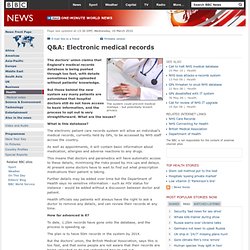
But those behind the new system say many patients are astonished that hospital doctors still do not have access to basic information, and the process to opt out is very straightforward. What are the issues? What is this database? The electronic patient care records system will allow an individual's medical records, currently held by GPs, to be accessed by NHS staff across the country. As well as appointments, it will contain basic information about medication, allergies and adverse reactions to any drugs. Upload of NHS care records suspended. The development of a medical records database for patients in England has been halted in some areas after doctors criticised the speed of the roll-out.
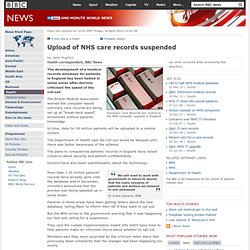
The British Medical Association warned the computer-based summary care records are being set up at "break-neck speed", sometimes without patients' knowledge. In time, data for 50 million patients will be uploaded to a central system. The Department of Health said the roll-out would be delayed until there was better awareness of the scheme. NPfIT's Summary Care Records system suspended - 19 Apr 2010. Summary Care Records System suspended One of the most controversial elements of the NPfIT, the Summary Care Records (SCR) system, has been suspended following industry criticism of a rushed implementation.
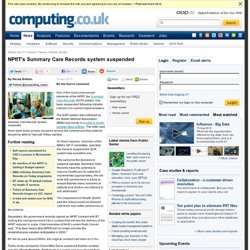
The SCR system was criticised by the British Medical Association (BMA) last month in a letter to health minister Mike O’Brien . The letter said there were some privacy concerns around the scheme and that patients should be able to "opt out" if they wanted. Dr Grant Ingrams, chairman of the BMA’s GP IT committee, said that the move to suspend the SCR system was a positive one. How the Health Committee took decision to hold NHS NPfIT inquiry - Public Sector IT Projects.
We reveal today (Tuesday 28 November 2006) that the Health Committee has decided to hold an inquiry into key facets of the National Programme for IT [NPfIT].
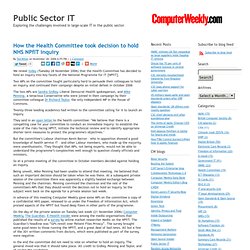
Two MPs on the committee fought particularly hard to persuade their colleagues to hold an inquiry, and continued their campaign despite an initial defeat in October 2006 The two MPs are Sandra Gidley, Liberal Democrat Health spokesperson, and Mike Penning, a tenacious Conservative who were joined in their campaign by their committee colleague Dr Richard Taylor, the only independent MP in the House of Commons. Twenty-three leading academics had written to the committee calling for it to launch an inquiry. They said in an open letter to the health committee: "We believe that there is a compelling case for your committee to conduct an immediate Inquiry: to establish the scale of the risks facing NPfIT, initiate the technical review and to identify appropriate shorter-term measures to protect the programme's objectives.
" About the SCR. One of the main aims of the NHS is to improve the safety, quality and efficiency of patient care.
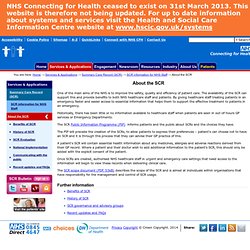
The availability of the SCR can support this and provide benefits to both NHS healthcare staff and patients. By giving healthcare staff treating patients in an emergency faster and easier access to essential information that helps them to support the effective treatment to patients in an emergency. Historically, there has been little or no information available to healthcare staff when patients are seen in out-of-hours GP services or Emergency Departments. The SCR Public Information Programme (PIP) informs patients and the public about SCRs and the choices they have.
The PIP will precede the creation of the SCRs, to allow patients to express their preferences – patient's can choose not to have an SCR and it is through this process that they can advise their GP practice of this. Statistics and the NPfIT "success" - Public Sector IT Projects. Imagine if the Department for Transport were to argue that its programme for reducing road deaths had been successful on the basis that: - 10,589,446 tonnes of an innovative anti-skid road surface have been deployed - 61,778 new traffic lights have been installed - More than 100,000 new tax discs have been issued to vehicles with the highest safety ratings - Registration of Blackberry-carrying lollipop ladies has reached 10,000 - Government road safety experts have exchanged more than one million e-mails - More than two million points have been issued to 550,000 new users of the Safety Camera Partnership Scheme - At least 1,600 road humps of both flat top and round top, of heights varying from 50mm to 100mm, have been installed in 49 towns and cities under the Highway (Road Humps) Regulations and their map coordinates are available to billions of users via the internet.
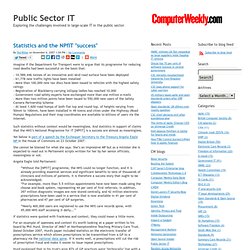
Such statistics without context would be meaningless. She cannot be blamed for what she says. Links: NHS Connecting for Health. It was planned that patients would also have access to their records online through a service called HealthSpace.
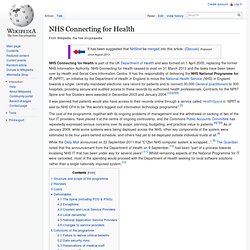
NPfIT is said by NHS CFH to be "the world's biggest civil information technology programme".[5] While the Daily Mail announced on 22 September 2011 that "£12bn NHS computer system is scrapped... ",[9] The Guardian noted that the announcement from the Department of Health on 9 September,[10] had been "part of a process towards localising NHS IT that has been under way for several years".[11] Whilst remaining aspects of the National Programme for IT were cancelled, most of the spending would proceed with the Department of Health seeking for local software solutions rather than a single nationally imposed system.[12] Structure and scope of the programme[edit] As of 2009, it was still managed nationally by CfH, with responsibility for delivery shared with the chief executives of the ten NHS strategic health authorities.[8] Reviews[edit] Costs[edit] Deliverables[edit] Exceptions[edit]
Whitehall officials pledge not to repeat troubles of Care Records Service go-live at Nuffield hospital - but similar problems have already occurred at another hospital - Public Sector IT Projects. The Department of Health has given MPs on the Public Accounts Committee an assurance that problems following a troubled go-live of nationally-bought systems at an Oxfordshire hospital will not be repeated elsewhere in the NHS.
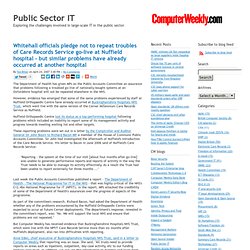
However, evidence has emerged that some of the same problems experienced by staff at Nuffield Orthopaedic Centre have already occurred at Buckinghamshire Hospitals NHS Trust, which went live with the same version of the Cerner Millennium Care Records Service as Nuffield. Nuffield Orthopaedic Centre lost its status as a top-performing hospital following problems which included an inability to report some of its management activity and progress towards meeting waiting list and other targets. These reporting problems were set out in a letter by the Comptroller and Auditor General Sir John Bourn to Richard Bacon MP, a member of the House of Commons' Public Accounts Committee. She added that there were "some difficulties in completing some aspects of reporting". Evidence mounts for NPfIT review - 11/28/2008. Friday 28 November 2008 14:01 It is often said that good results on IT-related projects and programmes rely on good communications.
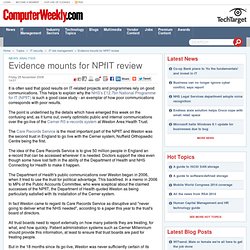
This helps to explain why the NHS's £12.7bn National Programme for IT (NPfIT) is such a good case study - an exemplar of how poor communications corresponds with poor results. NPfIT harmed by poor communications - Public Sector IT Projects. Comment and analysis It's often said that good results on IT-related projects and programmes rely on good communications.
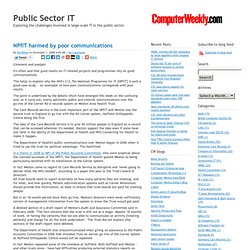
This helps to explain why the NHS's £12.7bn National Programme for IT [NPfIT] is such a good case study - an exemplar of how poor communications corresponds with poor results. NPfIT failures have left NHS IT “stuck” 24 January 2011 Sarah Bruce A new report by the NHS Confederation has criticised NHS technology for being similar to the “pre-industrial handicraft industry”. The National Project for Information Technology (NPfIT) NHS Connecting for Health (CfH) is the Department of Health agency established to support the NHS to deliver better, safer care to patients by providing better information where & when it's needed.
The National Programme for IT (NPfIT), which is being delivered by NHS Connecting for Health, is bringing modern computer systems into the NHS to improve patient care and services. New computer systems and services will link GPs and community services to hospitals. Health Committee MP criticises report on NPfIT electronic patient record - Public Sector IT Projects. Below is an article posted today on Computer Weekly's website about an MP's criticism of a "weak" report by the Health Committee on the electronic patient record, which is part of the NHS's National Programme for IT. A blog comment on the committee's report will be posted later. Mike Penning, an MP on the Commons' Health Committee, has criticised a report by his colleagues on aspects of the National Programme for IT (NPfIT).
He said the report of the Health Committee on the Electronic Patient Record - a central part of the NPFIT - was "very weak and a golden opportunity missed". Mike Penning, a Conservative MP, played a key role in persuading the committee to hold an inquiry into aspects of the NHS NPfIT. NPfIT. 422. Challenges to implementing the national programme for information technology (NPfIT): a qualitative study.